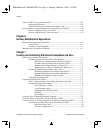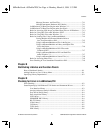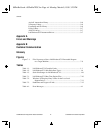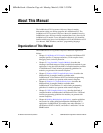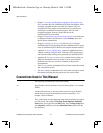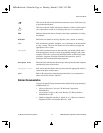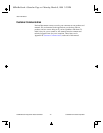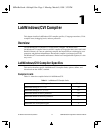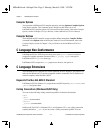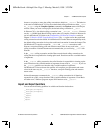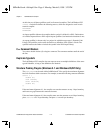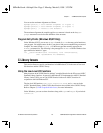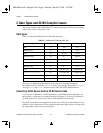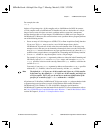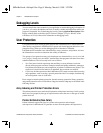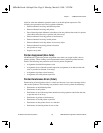
Chapter 1 LabWindows/CVI Compiler
LabWindows/CVI Programmer Reference Manual 1-2
©
National Instruments Corporation
Compiler Options
You can set the LabWindows/CVI compiler options by selecting Options»Compiler Options
in the Project window. This command opens a dialog box that allows you to set
LabWindows/CVI compiler options. For a discussion of these options, refer to the Compiler
Options section in Chapter 3, Project Window, of the LabWindows/CVI User Manual.
Compiler Defines
The LabWindows/CVI compiler accepts compiler defines through the Compiler Defines
command in the Options menu of the Project window. For more information, refer to the
Compiler Defines section in Chapter 3, Project Window, of the LabWindows/CVI User
Manual.
C Language Non-Conformance
LabWindows/CVI for UNIX does not allow you to pass a struct as one of a series of
unspecified variable arguments. Because of this,
va_arg (ap, type) is not legal in
LabWindows/CVI if
type is a struct type.
LabWindows/CVI accepts the
#line preprocessor directive, but ignores it.
C Language Extensions
The LabWindows/CVI compiler has several extensions to the C language. The purpose is to
make the LabWindows/CVI compiler compatible with the commonly used C extensions in
external compilers under Windows 95/NT.
Keywords That Are Not ANSI C Standard
LabWindows/CVI for Windows 3.1 accepts the non-ANSI C keywords pascal, PASCAL, and
_pascal, but ignores them.
Calling Conventions (Windows 95/NT Only)
You can use the following calling convention qualifiers in function declarations:
cdecl
_cdecl
__cdecl
(recommended)
_stdcall
__stdcall
(recommended)
In Microsoft Visual C/C++, Borland C/C++, and Symantec C/C++, the calling convention
normally defaults to __
cdecl if you do not use a calling convention qualifier. You can,
00ProRef.book : 06chap01.fm Page 2 Monday, March 9, 1998 3:23 PM



